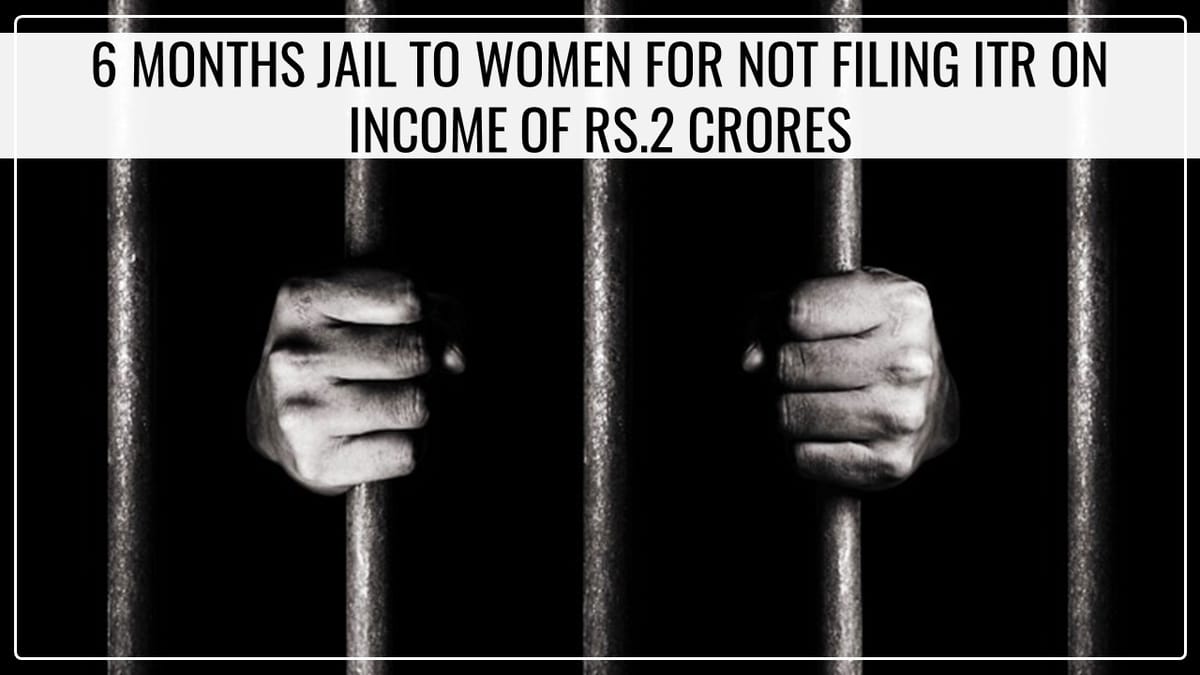A Delhi court recently convicted and sentenced a lady to six months in jail for failing to file a tax return on her Rs.2 crore income.
Reetu | Mar 11, 2024 |

Women sentenced to jail for not Filing ITR by Delhi Court
A Delhi court recently convicted and sentenced a lady to six months in jail for failing to file a tax return on her Rs.2 crore income.
The Income Tax Officer (ITO) filed a complaint alleging that TDS (tax deducted at source) of Rs. Two lakh was deducted against the accused’s receipt of Rs. Two crores during the financial year 2013-14, but the assessee/accused did not file a return of income for the assessment year 2014-15.
Mayank Mittal, Additional Chief Metropolitan Magistrate (ACMM), convicted Savitri after hearing submissions and examining the facts and circumstances of the case.
“The convict is awarded a sentence of simple imprisonment for six months with a fine of Rs.5,000 and, in default, to undergo simple imprisonment for one month,” ACMM Mittal stated in the order issued on March 4.
However, after reviewing her application, the court granted her 30-day bail to challenge the order.
According to Special Public Prosecutor (SPP) Arpit Batra, the intent of the law is more important than the amount of tax evaded when imposing a punishment on a defendant.
It was also argued that the purpose of the clause is to dissuade those obliged to pay taxes from filing their income tax returns on time and paying the tax as required. He also argued that the defendant should be sentenced to the maximum length of time in jail and fined heavily.
Counsel for the convict, on the other hand, contended that the sentence imposed on the convict should take into account the offender’s socioeconomic circumstances as well as his or her state at the time of the crime’s commission and imposition.
It was claimed that the inmate was a widow and uneducated. There is no one in the offender’s family to care for the family other than the convict himself.
According to the Prosecution, the ITO sent a letter to the convict on September 11, 2017, requesting verification of data on whether or not an income tax return was filed for the assessment year 2014-15; however, the accused did not respond.
A notice dated January 10, 2018, under Section 142(1) of The Income Tax Act, 1961 (IT Act) was issued to the accused with a direction to furnish the return of the assessment year 2014-15, however no compliance was made by the assessee / accused, the prosecution claimed.
On January 22, 2018, the ITO sent a notice to the accused under Section 271F of the IT Act for non-filing of the return, and the accused did not respond.
As a result, on February 9, 2018, the accused was ordered to pay an Rs.5,000 penalty. A proposal for granting sanction was sent to the Principal Commissioner of Income Tax.
Before a sanction was imposed, she was sent with a show cause notice under Section 276CC of the IT Act. The convict’s authorized representative then submitted a reply on her behalf on March 18, 2018.
After considering the matter and providing adequate opportunities to the convict, the Principal Commissioner of Income Tax, New Delhi, issued a sanction order authorizing the prosecution of the accused and directed the Income Tax Officer to file the current complaint under sections 276CC and 279 of the IT Act.
While convicting Savitri on February 28, the Court stated that the complainant was able to prove beyond reasonable doubt the service of a letter/notice issued to the accused on September 11, 2017, as well as a notice issued under Section 142(1) of The Act on January 10, 2018, requiring the accused to file a return of income, which the accused admittedly did not do.
The Court ruled that the accused may not submit any material or fact before the court to present its case under the proviso to Section 276CC of the Act. The accused could also not present any evidence on the record to refute the inference of a guilty mental state under Section 278E of the Act.
“As a result, the accused is found guilty of failing to file an income tax return for the assessment year 2014-15 under Section 276CC of the Act. As a result, the accused is convicted of an offence punishable under Section 276CC of the Act,” the court stated in its decision.
In case of any Doubt regarding Membership you can mail us at [email protected]
Join Studycafe's WhatsApp Group or Telegram Channel for Latest Updates on Government Job, Sarkari Naukri, Private Jobs, Income Tax, GST, Companies Act, Judgements and CA, CS, ICWA, and MUCH MORE!"